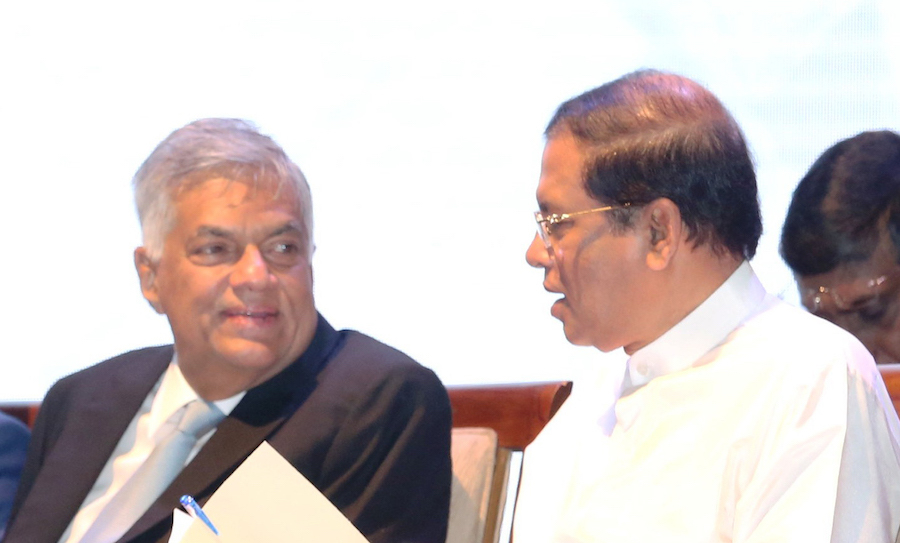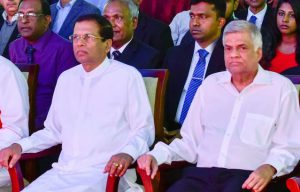Is The Government Back-Peddling On The Right To Information?


The Sirisena-Wickremesinghe Government has come in for strong criticism by media and civil rights lawyers after the proposed Audit Bill has sneakily suggested a clause that prohibits RTI applications from being filed against the Audit Service Commission and other individuals authorized by the Auditor General.
 Pointing to this development as ‘a clear and present danger’, the widely read Sunday Times asked on 13th May as to whether the Government is ‘back-pedalling on the Citizen’s Right to Information’? The Times has editorialized that openness and transparency through RTI will turn out to be a hollow boast if a pattern of conferring exceptions to RTI for specific individuals continues.
Pointing to this development as ‘a clear and present danger’, the widely read Sunday Times asked on 13th May as to whether the Government is ‘back-pedalling on the Citizen’s Right to Information’? The Times has editorialized that openness and transparency through RTI will turn out to be a hollow boast if a pattern of conferring exceptions to RTI for specific individuals continues.
The proposed clause in the Audit Bill states that information can be given by officers to information requesters only after the audit reports are presented to Parliament. Information can be disclosed prior to that only where there is a request of Parliament or an order of court or to give effect to the provisions of any written law, other than ‘any law requiring the disclosure of information’. If information is disclosed contrary to the above, an offence is committed. The Sunday Times has observed that any sensible reader of these clauses will see the obvious ‘potshots’ aimed at Sri Lanka’s globally acclaimed RTI Act, which the Government has boasted about locally and internationally.
The Colombo Telegraph learns that even some state officials involved in the drafting of the Audit Bill had not been in agreement with the wide cover given to a number of individuals by the proposed clause.
Meanwhile this is not the first such instance of a law providing RTI exceptions to individuals within a bare one and a half years of Sri Lanka’s globally praised RTI Act being enacted. The Island reported (May 9th 2015) that RTI Commissioner Kishali Pinto-Jayawardena who was a member of the drafting committee of the RTI Act had criticized the Office of Missing Persons Act as well as the proposed Audit Bill for containing such clauses. Responding to a question raised by a participant in the audience during a global conference on RTI held in Colombo last week, she explained that later laws which seek to protect individuals in a generalized manner from RTI scrutiny is not compatible with core ideals of RTI.
As of now, members, officers, servants and consultants of the Office of Missing Persons are shielded from responding to RTI requests in respect of information given confidentially to them. Families of the disappeared have said that they were concerned about this prohibition as the functioning of the OMP ought to be open and transparent in all respects. The RTI Act already lists privacy and confidential information given by third parties as two separate grounds on which information can be denied unless there is an overriding public interest.
In South Africa, the country’s Access to Information law had been extensively used by activists to get information on the functioning of the country’s Truth and Reconciliation Commission. One important example among many was when the South African History Archives (SAHA) filed an RTI request in 2016 for a report on funding for covert activities and weapons acquisition that the Auditor General of South Africa had prepared for the Truth and Reconciliation Commission and to which it denied public access. SAHA has argued that the requested records related to tax exemptions on the export of uncut diamonds and secret funding could shed light on the manner in which billions of South African rand in tax money, money badly needed for social spending requirements, was either never collected or spent on dubious and illegal activities at the end of the apartheid era. These experiences are good lessons for Sri Lanka. If the proposed clause in the Audit Bill is passed in its current form, information requests such as that filed by SAHA will not be possible.
Where Sri Lanka’s RTI Act is concerned, enacting new laws with exceptions to RTI defeats its Section 4 which places the Act above other written law as at the time the RTI Act was passed by Parliament (4th August 2016). It is common knowledge that though attempts were made to persuade the drafting committee of Sri Lanka’s RTI Bill to exempt some Departments and Offices from the reach of RTI at the time, these attempts were firmly resisted.
